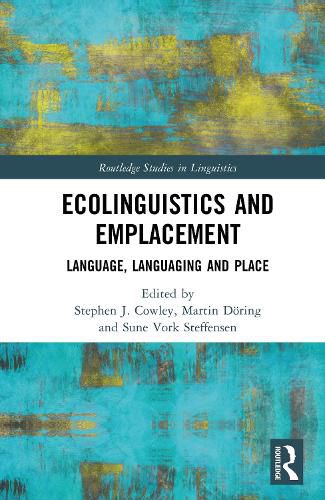Readings Newsletter
Become a Readings Member to make your shopping experience even easier.
Sign in or sign up for free!
You’re not far away from qualifying for FREE standard shipping within Australia
You’ve qualified for FREE standard shipping within Australia
The cart is loading…






This edited volume contributes to recent theoretical work in ecolinguistics that treats language as, not about nature, but of nature.
Through a dialogical interplay of theoretical and empirical work, the chapters apply ecological concepts of language, languaging, and emplacement to a multiplicity of issues, settings, and place-worlds. Empirically, the chapters meander through a universe of chimpanzees engaged in problem solving, children playing marbles, political constitutions, agricultural dictionaries, Sicilian nature reserves, children's experiences of devastating outbreaks of foot and mouth disease, expressions of sorrow across closed borders, and the linguistic conquest of uninhabited islands. By attending to locale, sense of place, and location across this diversity, the volume evokes new empirical, methodological, and practical horizons that allow ecolinguists to ask how people and their emplacement are affected by language and languaging, and how the effects of practices impact on, not just human lifeworlds, but also trillions of bioecologies.
This book will be of interest to students and scholars interested in ecolinguistics, discourse analysis, applied linguistics, language contact, environmental humanities, and human and social geography.
$9.00 standard shipping within Australia
FREE standard shipping within Australia for orders over $100.00
Express & International shipping calculated at checkout
This edited volume contributes to recent theoretical work in ecolinguistics that treats language as, not about nature, but of nature.
Through a dialogical interplay of theoretical and empirical work, the chapters apply ecological concepts of language, languaging, and emplacement to a multiplicity of issues, settings, and place-worlds. Empirically, the chapters meander through a universe of chimpanzees engaged in problem solving, children playing marbles, political constitutions, agricultural dictionaries, Sicilian nature reserves, children's experiences of devastating outbreaks of foot and mouth disease, expressions of sorrow across closed borders, and the linguistic conquest of uninhabited islands. By attending to locale, sense of place, and location across this diversity, the volume evokes new empirical, methodological, and practical horizons that allow ecolinguists to ask how people and their emplacement are affected by language and languaging, and how the effects of practices impact on, not just human lifeworlds, but also trillions of bioecologies.
This book will be of interest to students and scholars interested in ecolinguistics, discourse analysis, applied linguistics, language contact, environmental humanities, and human and social geography.